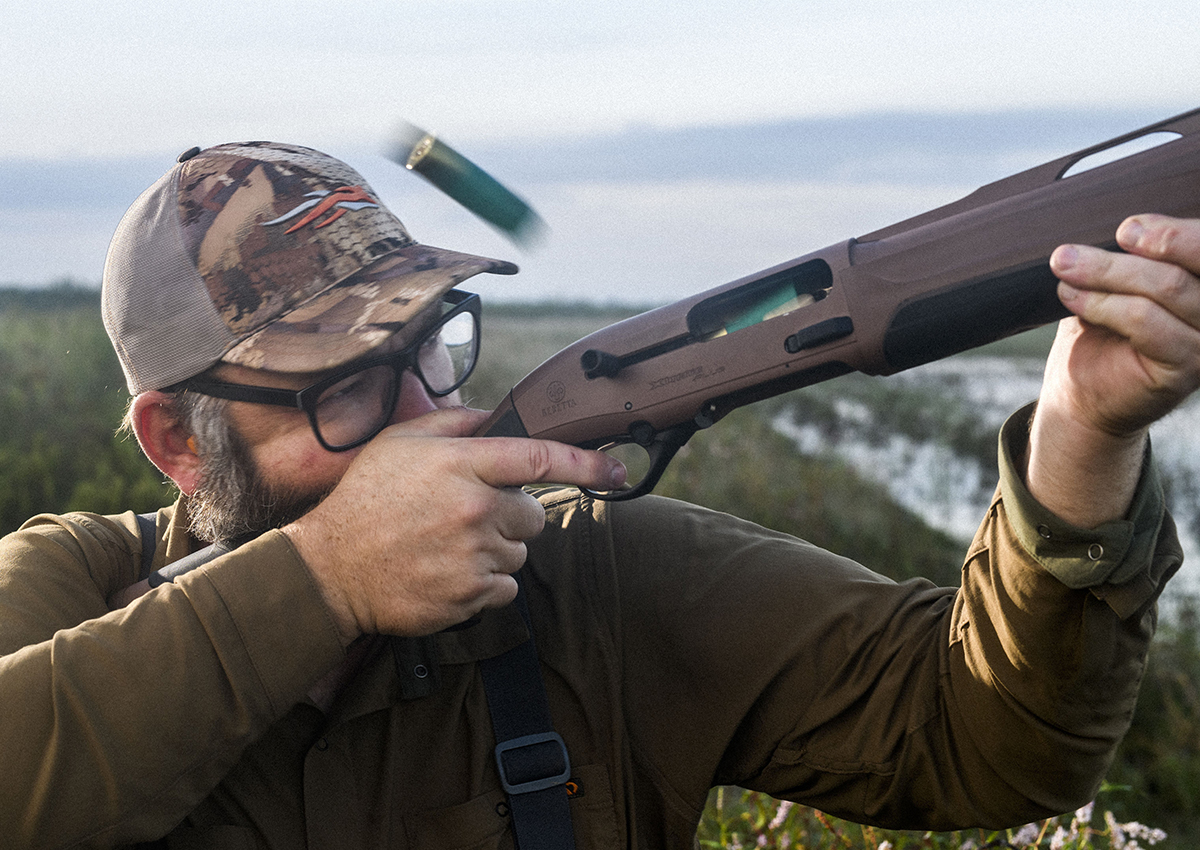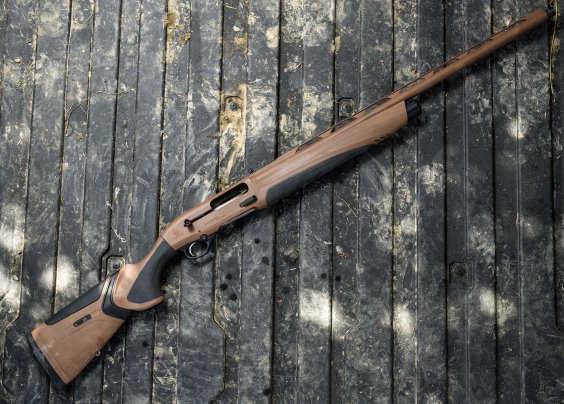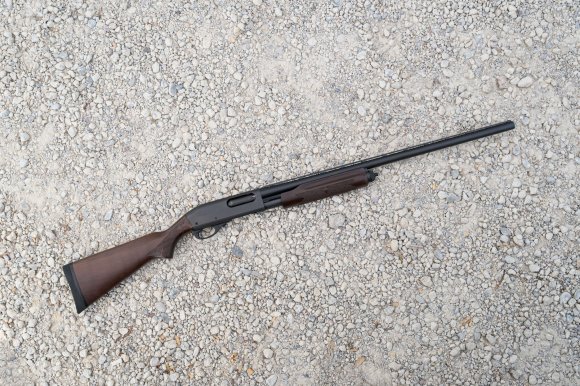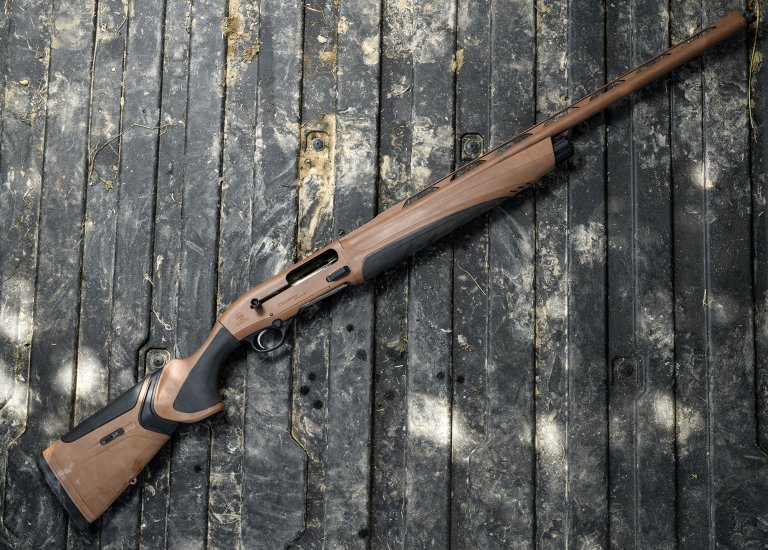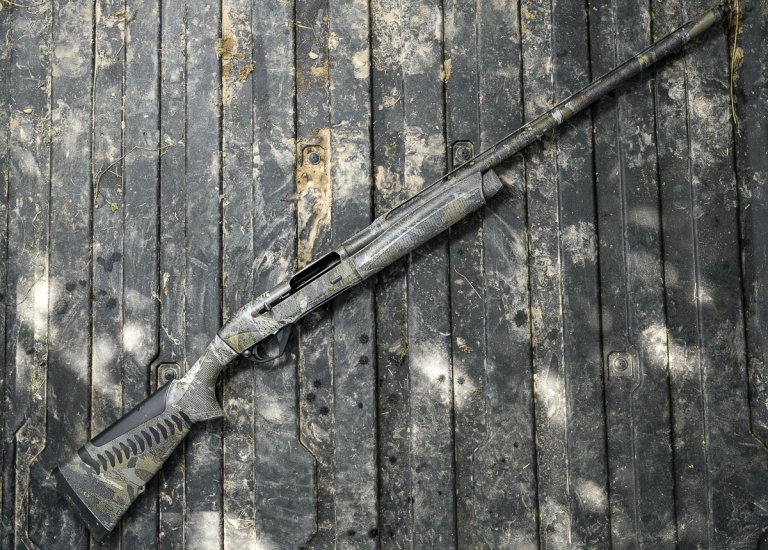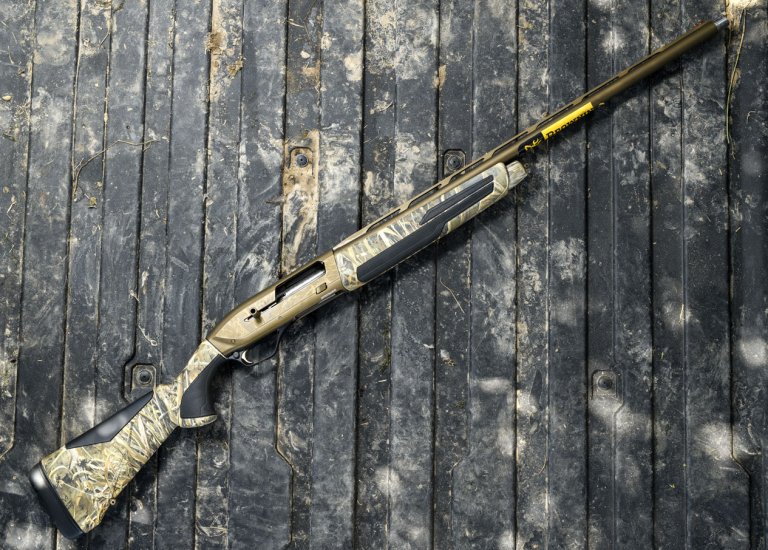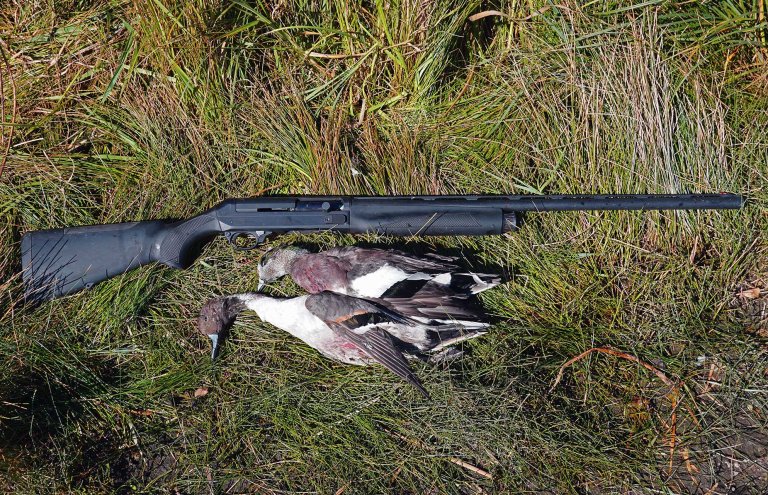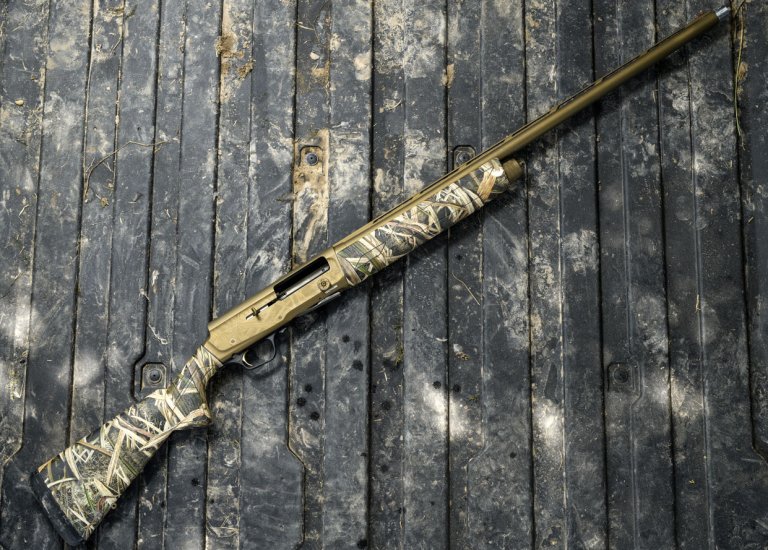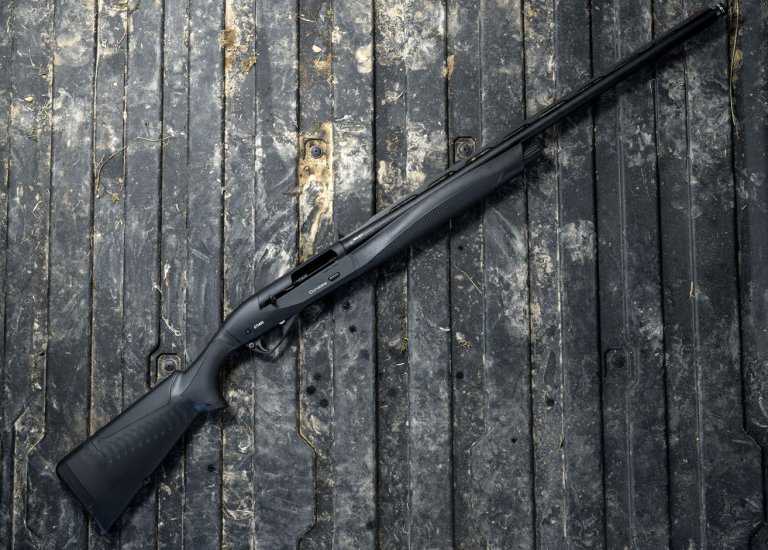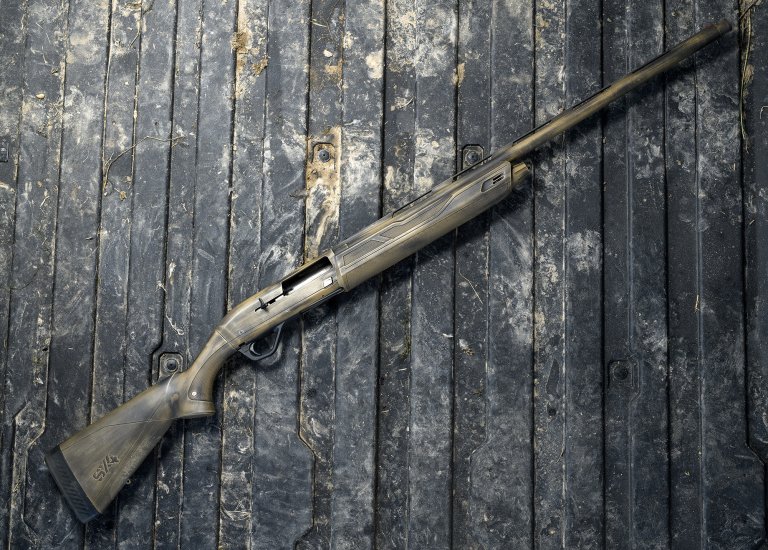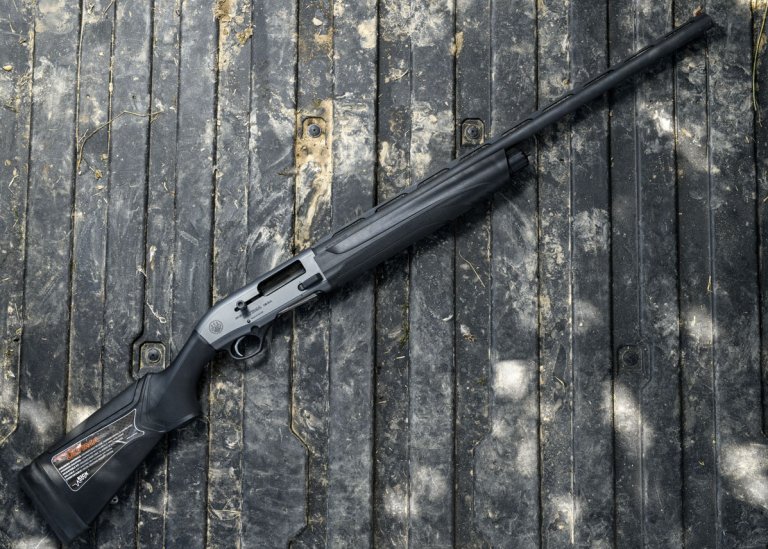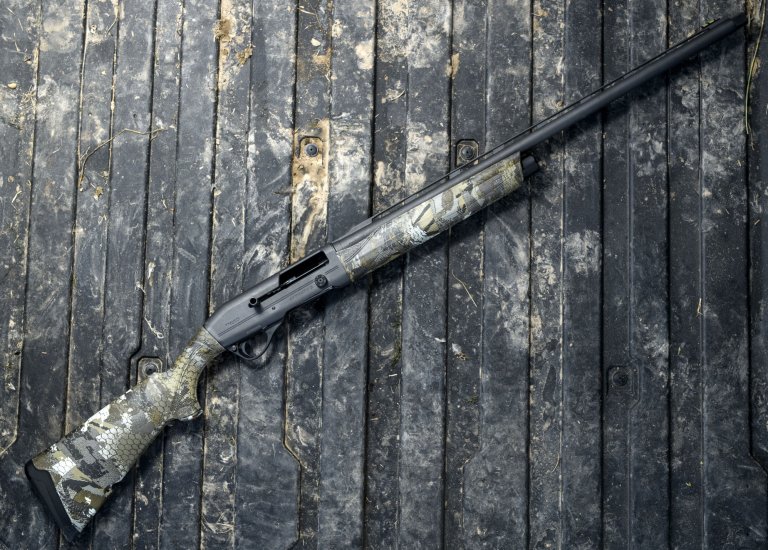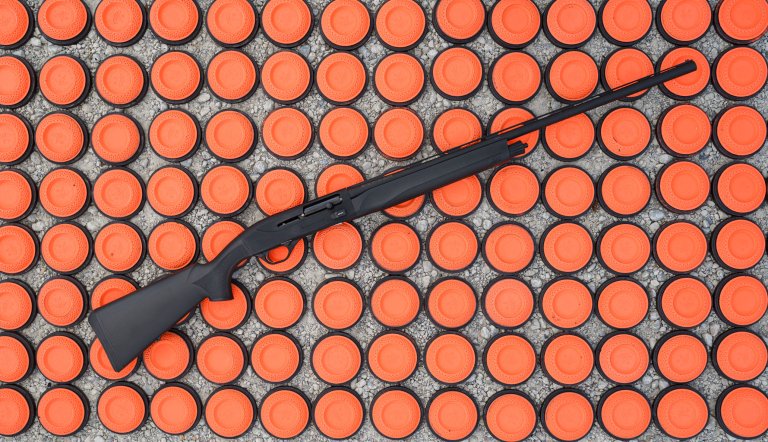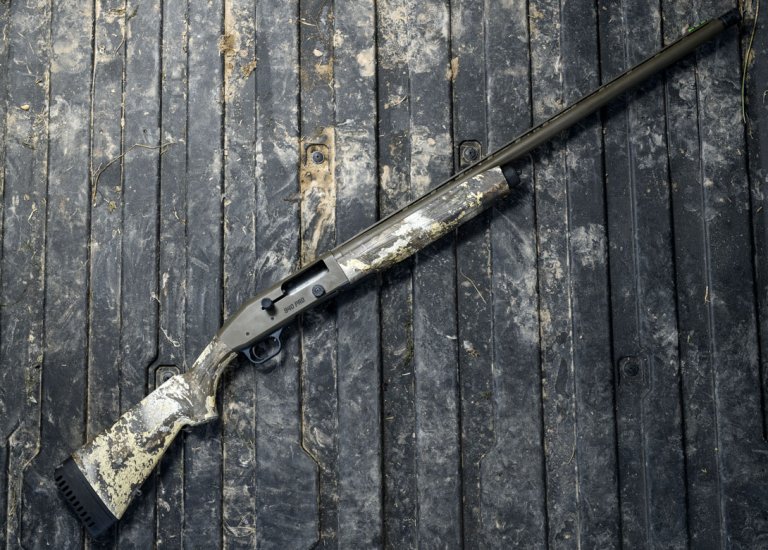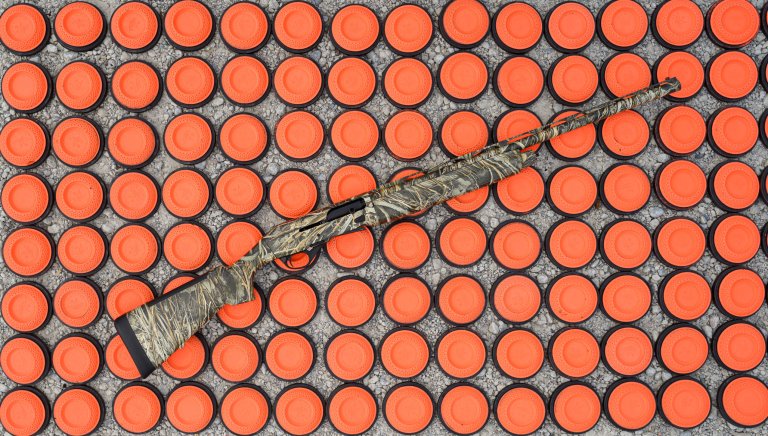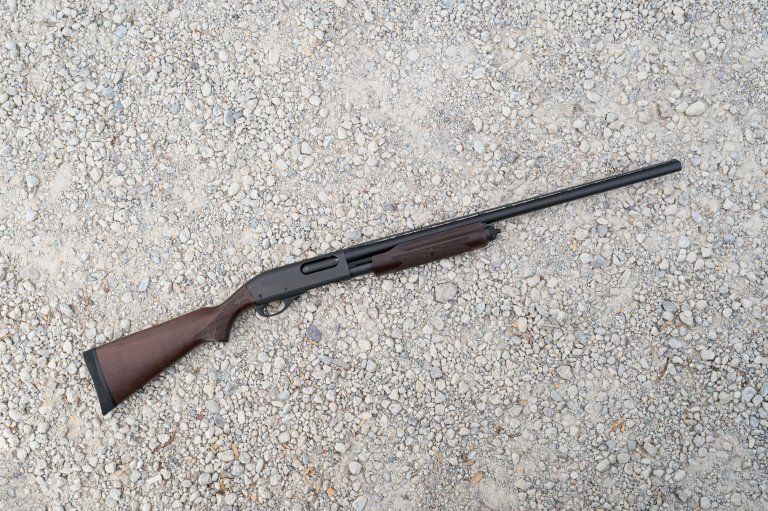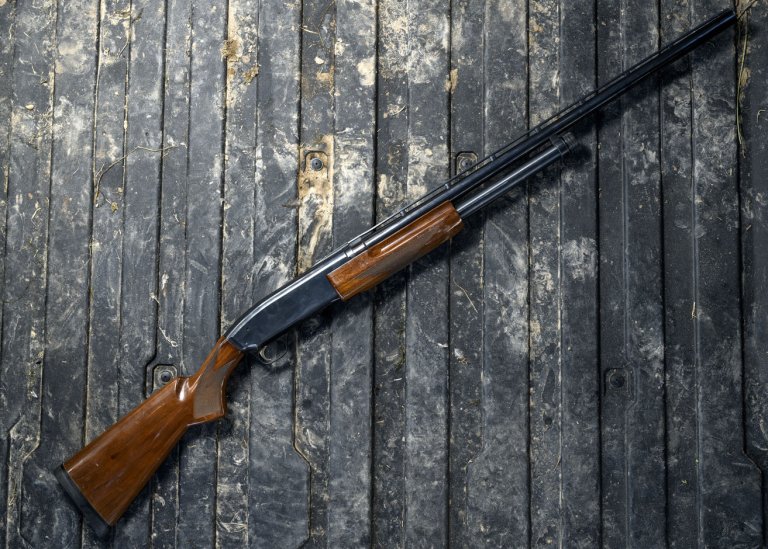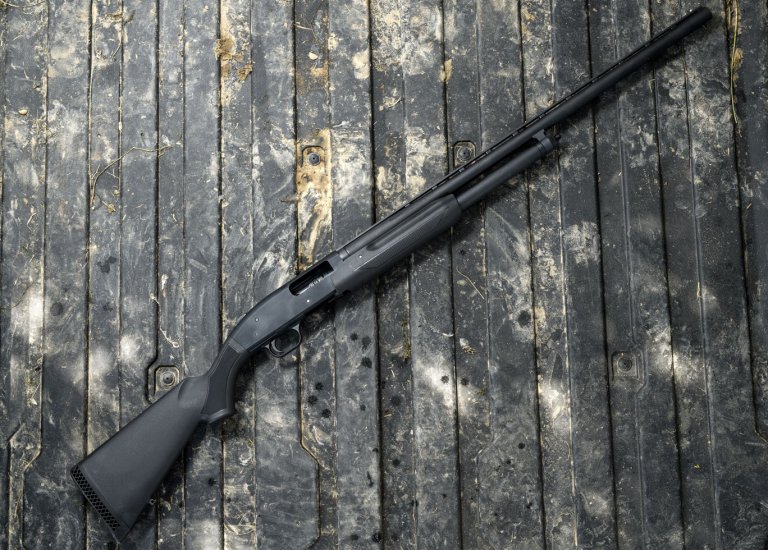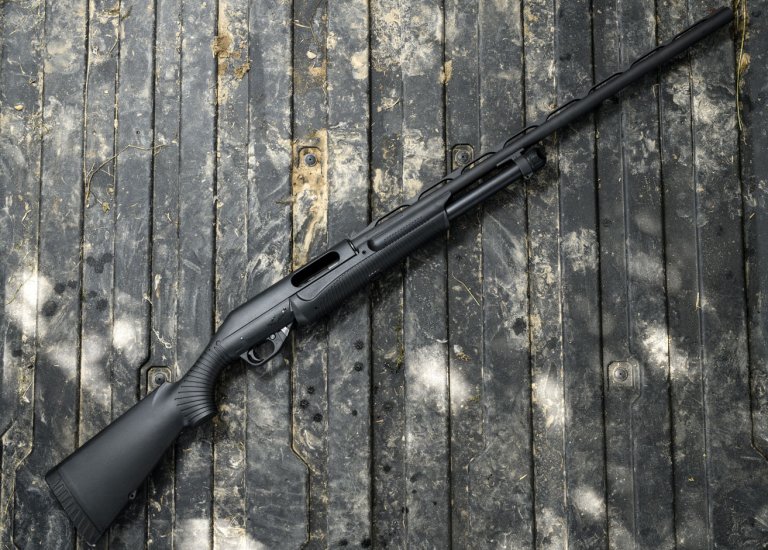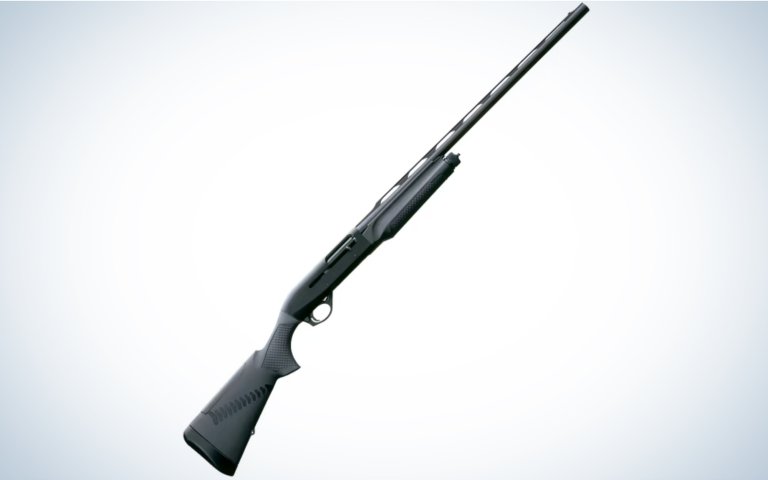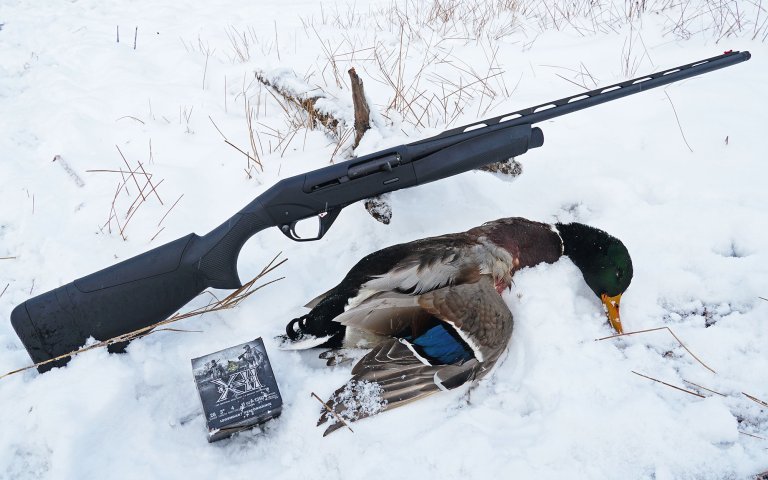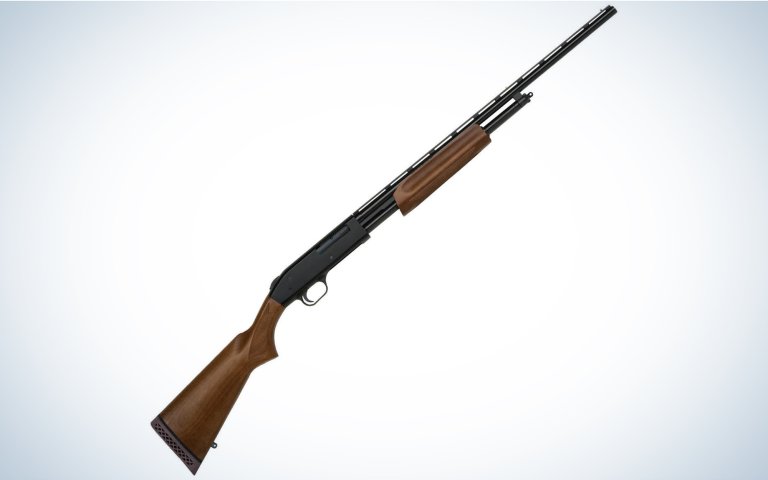We may earn revenue from the products available on this page and participate in affiliate programs. Learn More ›
Ask a duck hunter what company makes the best duck hunting shotguns and the three most likely responses will be Beretta, Benelli, or Remington. So, it wasn’t too surprising that those gun manufacturers—along with Winchester—stood above the rest in our waterfowl shotgun test.
These were our top picks:
- Editor’s Choice: Beretta A400 Xtreme Plus
- Great Buy: Winchester SX4
- Best Pump Shotgun: Remington 870 Fieldmaster
Beretta has been making soft-shooting gas-operated autoloaders since 1956 with the introduction of the Model 60. The almost 500-year-old company has come full-circle with the A400 Xtreme Plus, which is arguably the softest shooting sporting shotgun on the market, and a major reason why it was popular with our group of testers.
Benelli’s inertia-driven Super Black Eagle is carried by duck guides all over the country because it’s lightweight, rarely fails, and is one of the best-handling shotguns you will ever bring to your shoulder. Remington has sold more than 11 million 870s over the years—enough said. And Winchester’s Super X4 (SX4) gives the most value for the dollar out of any shotgun on the market.
But there were plenty more duck hunting shotguns that performed well in our test—and some that didn’t. If you’re a duck hunter looking to buy a shotgun, this is the most comprehensive review of the best (and worst) auto-loaders and pumps you will find.
How We Tested the Best Duck Hunting Shotguns

In 2021 a team of editors tested 17 of the best duck hunting shotguns over three days at Pintail Hunting Club in Garwood, Texas. We shot every shotgun at a five-stand clays range, patterned each shotgun at 35 yards inside a 30-inch circle, and hunted teal during Texas’ September early season with an assortment of Federal Premium, Remington, and Hevi-Shot ammo.
In the years since that field test in Texas, we’ve shot and hunted with a handful of new models in our annual shotgun test and have hunted with a variety of duck guns each season.
We broke down the field into premium-level semi autos, bargain-level semi autos, pump guns, and sub-gauge shotguns.





We used stock modified chokes for hunting and patterning the guns. We shot #4 Hevi-Hammer and Remington Nitro Steel while hunting and 3-inch, #2 Federal Speed Shok for patterning. From there, each of us evaluated the shotguns in five different categories: handling and ergonomics, workmanship and aesthetics, versatility, reliability, and value.

Here’s what each of those categories entails:
Handling & Ergonomics: Handling represents the balance, liveliness, and ability to hit targets with the shotgun. It also represents how the shotgun manages recoil. Ergonomics represents how well the firearm fits the hands and body. That includes grading how intuitive and easy the controls are to manipulate, and the ease with which you can load and unload the firearm.
Workmanship & Aesthetics: This covers the quality of the materials and construction of the shotgun. It also includes looking at the fit and finish of the metal and stock. Is the gun’s exterior—matte, blued, Cerakote, etc—done well? Does it look and feel durable?
Versatility: Is the gun capable of functioning well in multiple hunting scenarios? Is it good for pits, box blinds, walk-ins, ground blinds—essentially anyplace duck hunters hunt. Can it be used to hunt other types of game than waterfowl and shoot clays?
Reliability: This represents how well the firearm functioned mechanically throughout the evaluation and whether it had any failures or malfunctions, some of which we tried to deliberately induce, like throwing dirt into the action, shaking it out, and firing a shotshell. Or dropping the gun in water or mud, loading, and firing it.
Value: Does the price tag match the shotgun? Are you getting what you have paid for? Would you recommend it as a good buy to one of your buddies?
Premium-Level Auto-Loaders
Editor’s Choice Winner: Beretta A400 Xtreme Plus
Key Features
- Gauge: 12
- Chamber: 3.5-inch
- Length: 49.5 inches
- LOP: 14.3 inches
- Trigger weight: 5.1 pounds
- Overall weight: 7.8 pounds
- MSRP: $1,749

Beretta’s A400 finished just ahead of the Benelli Super Black Eagle III. In fact, every editor had to shoot both guns on sporting clays one final time on the last afternoon to decide the winner. Ultimately, the A400 won best duck hunting shotgun because it’s a softer-shooting gun than the SBE3, and it also patterned more accurately. The Benelli put more pellets in the 30-inch circle at 35 yards (121 to 109 for the A400) when we compared the two guns’ best patterns, but the SBE3 shot 100 percent above point-of-aim on every shot. Beretta’s A400 was a much more center-mass pattern that shot 60 percent above and 40 percent below point-of-aim. You will notice this model has a custom Cerakote finish on it. Standard issue A400s are available in Realtree, Mossy Oak, True Timber, and Kryptek camouflage, as well as a synthetic option.

The reason why the A400, which is gas-operated, is so light on recoil is a two-part Kick-Off system in the stock. The Kick-Off Mega is a three-spring system that dampens recoil and then the Kick-Off3, located in the grip of the shotgun also mitigates felt recoil. I’ve shot 2-ounce turkey loads through this gun and it mildly tapped my shoulder—it’s remarkably easy on the shooter. Also, as previously mentioned, the A400 patterning is superior. Where you point the gun, is where it shoots. You also get an oversized bolt handle and bolt-release button for easier handling, plus the load gate is wide and easy to manipulate even with thick gloves on. The one drawback of the A400 is a fat fore-end, and the fact that it carries more like an 8-pound gun. If you have small hands and don’t like to tote a shotgun that’s a few ounces heavier than most other auto-loaders, you may not love the A400 as much as we did. There wasn’t a gun in the test that all four shooters were more accurate with—some were equally accurate, but none better—than the Beretta. And none of us had a bad morning in the marsh trying to knockdown acrobatic blue-wings with this gun. That’s what you want in a duck gun. If can shoot a shotgun well on early teal, you’ll shoot it well on any species of duck. —J.G.
Benelli Super Black Eagle III
Key Features
- Gauge: 12
- Chamber: 3.5-inch
- Length: 49. 5 inches
- LOP: 14 inches
- Trigger weight: 6.2 pounds
- Overall weight: 7 pounds
- MSRP: $1,699
This gun came in a close second as best duck hunting gun. The SBE3 is one of the best-handling semi-auto shotguns ever made. It’s sleek, and light, so you can get the gun moving fast, which is important for duck hunters because our shot windows can get tight. This is the ultimate guide gun because it only weighs 7 pounds and can stand up to the 100-plus days of hell a guide will put it through each season. You don’t see a lot of pro hunters carrying the A400, and that’s because the SBE3 is almost a pound lighter and functions just as well.

There’s a little bit more recoil in the Benelli, but it’s not bad for an inertia gun. The Comfortech system, a series of interlocking synthetic chevrons in the stock, makes recoil incredibly manageable, and unlike some inertia guns, the SBE3 can shoot 1-ounce target loads without issue. You won’t find a more simple, easy-to-clean semi-auto waterfowl shotgun on the market. The only thing that takes a bit of time is unscrewing the fore-end cap—it took us 12 twists to get it off. The A400 cap comes off with a simple half-turn. You won’t get the “Benelli click” with the SBE3.

The rotating bolt head has a spring in it that forces the head to close and ensures there is a secure lockup with the shotshell, so the firing pin strikes the primer. Our sample did shoot high—100 percent above point of aim—but surprisingly, that didn’t matter on teal or at the five-stand. If you cover the target, this gun kills it.
Since we initially reviewed the SBE 3, Benelli has made some upgrades. They now offer a BE.S.T. model which has a carbon fiber rib and a fancy, weather resistant coating. Of course these features cost a bit more. New for 2025, Benelli is also introducing an “Advanced Impact” model which promises to improve pellet penetration. We can’t wait to get our hands on this gun to field test it. —J.G.
Browning Maxus II
Key Features
- Gauge: 12
- Chamber: 3.5-inch
- Length: 47.25 inches
- LOP: 14.4 inches
- Trigger weight: 6.4 pounds
- Overall weight: 7 pounds
- MSRP: $1,600
The second-generation Maxus has the same Power Drive gas system as the original, but that’s about where the similarities end between the two guns. Browning Maxus II’s most important upgrade is the fore-end cap, which can now be removed and outfitted with an extension magazine tube for snow goose hunters. The first Maxus had a fore-end latch, the premise of which was to be able to remove the fore-end quickly. But if you pay $1,800 for a shotgun, you should be able to affix an extension mag to it, and the old Maxus didn’t allow for that.

The exterior upgrades on this gun are exemplary and make it one of the best duck hunting shotguns on the market. You get a slender fore-end that is outfitted with rubber grips for better handling in cold and wet conditions. There is also a rubber grip for your shooting hand on the palm swell of the stock, and a cushioned rubber riser for your cheek, plus a thick recoil pad to mitigate recoil. An oversized bolt handle makes pulling the bolt back easy, and there’s plenty of room in the trigger guard for your trigger finger even if you’re wearing thick decoy gloves. This gun was also designed with the Speed Load Plus system, which allows you to load the first shell into the magazine and the lifter will load it into the chamber for you. It can take some precise finger work to get the speed loader to function, but it’s a nice feature once you get the hang of it. You can read my full review on the Maxus II here. —J.G.
Breda B3.5SM
Key Features
- Gauge: 12
- Chamber: 3.5-inch
- Length: 49.5 inches
- LOP: 14.25 inches
- Trigger weight: 5.25 pounds
- Overall weight: 7.37 pounds
- MSRP: $2,100
I got my hands on the hefty, inertia-driven B3.5SM during the summer of 2024 and I hunted with it through most of that duck season. As I burned through box after box, I began to like the shotgun more and more. By the end of my waterfowl season, I’d hunted with the B3.5SM in Minnesota, Wisconsin, and the Dakotas and was ready to declare it as a true contender to the Benelli Super Black Eagle 3. Read my full review of the Breda B3.5SM here.

The B3.5SM is essentially a refined version of the original SBE from the HK-imported 1990s models. But nostalgia only gets you so far, so I was thrilled to see that my test gun threw impressive 50/50 patterns.
So I shot Federal Speed Shok No. 2 with a 1 ¼ ounce payload and Remington Nitro Steel No. 2 with a 1 ¼ ounce payload at 40 yards using the Modified choke that came with the gun. I shot four patterns with each load and averaged them.
Average Pellet Strikes in a 30-Inch Circle:
- Federal Speed Shok: 127
- Remington Nitro-Steel: 130

For context, this is phenomenal performance, which becomes apparent when you compare the data to those from other guns in this list. Under the same shooting protocol with the same ammo, my SBE 3 averaged 107 pellet strikes with the Federal load and 117 pellets with the Remington load. Of all the best duck hunting shotguns we’ve tested, I’d put the Breda up against any of them in terms of pattern performance.
In the marsh the Breda pointed naturally and swung nicely. I shot the gun well all season, smashing ducks near and far. I appreciated the feel and grippiness of the stock, which has a rubbery, soft-touch finish. After I had run several hundred rounds through the gun and dropped it in the mud at least twice, I finally got a first failure — the bolthead had not rotated all the way into battery and the gun went “click” instead of “boom.” After that hunt I cleaned the gun and resumed killing ducks. Then on the final hunt of the season (during a freezing morning on the river) I got my second malfunction — the gun fired the first round but failed to cycle the second.

In my experience, two malfunctions over the course of a long duck season of hard hunting, with only one honest cleaning, is pretty damn good performance from recoil operated shotgun. —A.R.
Browning A5
Key Features
- Gauge: 12
- Chamber: 3.5-inch
- Length: 49 inches
- LOP: 14.25 inches
- Trigger weight: 6.9 pounds
- Overall weight: 6.8 pounds
- MSRP: $1,500
The “new” Browning A5 has been around for almost 10 years now and operates on an entirely different inertia system than John Browning’s original long-recoil model in which the barrel moved back into the receiver of the Auto-5 upon firing it. The A5 has a similar system to Benelli shotguns. When you fire the A5, the bolt stays still as the rest of the gun moves backwards under recoil—hence the “inertia.” This action compresses a powerful spring in the bolt assembly and once the gun encounters resistance from your shoulder, the spring unleashes its force and cycles the bolt, ejecting the spent shell, and collecting a new round on its trip back into battery.

One thing we all noticed in testing the Browning guns was that they all patterned very evenly and delivered some of the tightest patterns of all the shotguns, though the A5 (77 percent) was not as good as the Maxus II (86 percent) and BPS (83 percent) inside a 30-inch circle at 35 yards. It also has the Speed Load Plus system like the Maxus II, but you won’t find any rubber grips on this gun. I’ve shot the A5 quite a bit in prairie Canada which is a damn fine test of a gun’s ability to function. You shoot a lot more than you would in the states (because of higher bag limits), and guns get a lot dirtier because you’re often laying in dusty ag fields. The A5 never failed to perform. I have had some issues with the bolt running properly in cold weather, but a good cleaning has always taken care of that problem.
If you step down to a 7/8-ounce charge weight, reliable cycling can be an issue, but inertia guns aren’t built to function with such a light load. —J.G.
Benelli Ethos Cordoba BE.S.T.
Key Features
- Gauge: 12
- Chamber: 3-inch
- Length: 49 inches
- LOP: 14 inches
- Trigger weight: 6.1 pounds
- Overall weight: 6.5 pounds
- MSRP: $2,349
Named for the region of Argentina most famous for its dove hunting, Benelli’s Ethos Cordoba was built for high-volume shooting. The barrel of the Cordoba is ported for lighter recoil and to minimize muzzle jump which helps you get back on the bird after a miss. Or, if you connect, you can move on to another bird with relative ease. It’s a Benelli, so it’s a well-built gun. We had no malfunctions with it in our testing. The BE.S.T coating, which Benelli touts as the best exterior gun finish on the market, did not chip or rub off. It’s also rust- and corrosion-resistant, but you should still take care of your gun the same way you would if the finish was not applied. Metal eventually rusts after all.

Like the SBE3, the Ethos patterned high, but it was a touch worse in this gun. My best pattern with the Cordoba was 100 percent above point-of-aim. The rest were 120 percent above POA. And unlike the SBE3, that did make a difference on five-stand clays. I had to aim a foot below the bird to break it. That’s not ideal when ducks are in the decoys, but if you like to see the target and not cover it up when you swing on a mallard, you will like this gun very much. It also comes with five extended chokes (C, IC, M, IM, and F). Plus, there’s a small window that runs the length of the fore-end so you can see how many shells are left in the magazine tube (this feature is more for Argentina dove hunts where you can shoot unplugged shotguns). The Cordoba is also offered in 20- and 28-gauge. With an MSRP over $2,300 it’s a little steep for me. I don’t see any features—other than the BE.S.T. coating—that make this gun cost $600 more than a standard SBE3. —J.G.
Bargain-Level Auto-loaders
Great Buy Winner: Winchester SX4
Key Features
- Gauge: 12
- Chamber: 3.5-inch
- Length: 49.5 inches
- LOP: 14.25 inches
- Trigger weight: 5.9 pounds
- Overall weight: 7.1 pounds
- MSRP: $899

There’s no other 3.5-inch gas-operated auto-loader that you can buy for under $1,000 that holds a candle to the Winchester SX4. There’s no cheaping out in this gun either, which is remarkable considering the price tag. The SX3 was my favorite affordable shotgun before the SX4, which is a bit slimmer than the previous version of this gun, and also less expensive. The original SX1 was a beloved gun by many waterfowlers as well, it was just an absolute tank, which made it durable but a brute to carry.

The SX4 is not heavy at all, just 7.1 pounds. It’s the most versatile gun in the test, due to its light weight and the fact that it’s a gas gun. I’ve shot plenty of turkey loads through the SX4 and taken it on high-volume snow goose hunts, and it has never left me with a sore shoulder. This is my personal gun, which I had modified by Rob Roberts (lengthened forcing cone and specialized choke). One point of interest was that it patterned slightly better on the 30-inch board with the stock modified choke (89 percent) than Roberts’ Triple Threat T2 (83 percent). I’ve also shot the standard version of this gun many times without any aftermarket modifications. All of the SX4s, including the 20-gauge model, have patterned well at the range and killed ducks and geese cleanly as long as I did my job. —J.G.
Beretta A300 Ultima
Key Features
- Gauge: 12
- Chamber: 3-inch
- Length: 47.5 inches
- LOP: 13.8 inches
- Trigger weight: 5.14 pounds
- Overall weight: 7.7 pounds
- MSRP: $749
Ever since the A390s were discontinued, Beretta has been trying to build an affordable 3-inch auto-loader that gives shooters a reason to buy a new shotgun as opposed to finding a used Silver or Gold Mallard. The A300 Ultima is as close as Beretta has come to accomplishing that goal. The Ultima shot a consistent pattern of 60 percent above and 40 percent below point-of-aim, which is a staple of Beretta shotguns and why they are some of the best duck hunting shotguns on the market.

Beretta also included the Kick-Off system in this gun to tame recoil, but it’s not as advanced as the one you will find in the A400 Xtreme Plus. The Ultima Kick-Off has two springs in the stock and the A400 has three. You can tell the difference when shooting the two guns. The Ultima delivers a noticeable “pop” to your shoulder when you pull the trigger. And the stock also pulls at your face a bit. You won’t feel anything except a slight push against your shoulder shooting the A400.
But, you can remove the Kick-Off system from the stock, and essentially replace it with a plastic spacer. That will probably make the gun much more comfortable to shoot, honestly. The exterior features are superb on the Ultima. It looks just like the A400, only slimmer, and there is a 20-gauge option that’s even less cumbersome. But the matte finish on the barrel was rubbing off after just a few days. Granted it was riding around in the back of a UTV next to other unloaded shotguns, but none of those guns experienced the same level of wear and tear. —J.G.
Franchi Affinity 3
Key Features
- Gauge: 12
- Chamber: 3-inch
- Length: 49.5 inches
- LOP: 14.2 inches
- Trigger weight: 5.14 pounds
- Overall weight: 6.8
- MSRP: $750
I don’t see many duck hunters shooting Franchis, which is baffling, because the Italian gunmaker—which falls under the Benelli canopy of brands—builds some of the most reliable shotguns for the money. The Affinity 3 operates on the same inertia system as the Benellis do, it’s just made with some less expensive exterior features, like a flat, rubber-coated bolt-release and the plastic feel of the stock and fore-end. But the Affinity is a little lighter (remember it’s a 3-inch gun versus the SBE3, which has a 3.5-inch chamber).

Also, the Franchi Affinity 3 beat all of the Benellis on the pattern board in our test. It shot 60 percent above and 40 percent below point-of-aim on paper, and the best Affinity pattern was a few pellets better than the SBE3, which shot 100 percent high point-of-aim. The Franchi has the same slim fore-end you will find on all Benelli semi-autos, which improves the overall feel of the shotgun and makes it easy to shoot. The recoil is also extremely manageable for an inertia gun. There’s a thick TSA recoil pad that will tame any 3-inch shotshell, and I have found that follow up shots—after I have fired my customary first warning shot at ducks—with the gun make it easy to get on the bird. This shotgun also comes in a left-hand model, which is a big deal for those of us who shoot lefty, because there are so few left-eject shotguns on the market that can be had for less than $800. TriStar and Remington are the only other two manufacturers that make affordable shotguns specifically for lefties. —J.G.
Retay Gordion Extra Black
Key Features
- Gauge: 12 and 20 (tested)
- Chamber: 3-inch
- Length: 49.5 inches (28-inch barrel)
- LOP: 14.37 inches
- Trigger weight: 3 pounds, 10 ounces (measured)
- Overall weight: 6.29 pounds (measured)
- MSRP: $899
The price window of $800 to $1,000 is a bit of a sweet spot for semi-auto duck guns. For this kind of money you should expect a semi-auto shotgun to cycle reliably, handle and point well, pattern consistently and look … well, not ugly. For years Winchester’s SX platform has been a standout in this competitive field and it’s still our Great Buy pick for an all-around affordable duck gun. But man, the Retay Gordion is definitely threatening the SX4’s reign.
This is a Turkish-made, inertia-driven shotgun that mimics the sleek design and style of the much pricier inertia-driven Benelli Super Black Eagle. We evaluated the 20-gauge version of the Gordion during our 2023 shotgun test and everyone shot it well. It ran through hundreds of rounds without issue and we never gave it a cleaning.

The Gordion is definitely lacking in the fit and finish department compared to pricier duck guns. “The controls look clunky but work well,” commented shooting editor John B. Snow. “There’s some sloppy fit and finish and the metal finish is so-so.”
The gun’s matte black finish was starting to show some scratches during our testing. Later, I took the Gordion hunting during Minnesota’s early teal season. I hiked deep into a hellaciously muddy slough that was full of teal. I was thankful for the shotgun’s portable weight during the long slog. At legal shooting light, I got down to business and quickly killed a few bluewings. After my dog retrieved the ducks and I sloshed around repositioning decoys, we were all absolutely caked in mud, including the Gordion. At this point the gun began to have trouble cycling reliably. This didn’t surprise me. Many semi-auto shotguns jam up when their actions and controls get dirty or frozen. Would a high-end Benelli have jammed under the same conditions? Perhaps—but probably not.

Still, the Gordion is an excellent option in the mid-priced semi-auto category. It’s sleeker than the gas-operated SX4 and it’s a bit less expensive than the Franchi Affinity 3. It’s a duckslayer for sure, just keep it clean to keep it running. —A.R.
Mossberg 940 Pro Waterfowl
Key Features
- Gauge: 12
- Chamber: 3-inch
- Length: 48.5 inches
- LOP: 13.5 inches
- Trigger weight 5.11 pounds
- Overall weight: 7.7 pounds
- MSRP: $868
Mossberg unveiled the Mossberg 940 JM Pro a few years ago at Shot Show. This is the waterfowl version of that gas-operated auto-loader. Mossberg has tested this gun and says the gas system runs clean enough that you can shoot 1,500 rounds through the 940 before it needs cleaning. We didn’t shoot that many shells through it in our test — there’s an ammo shortage after all — but it’s true that we never did experience a hiccup with the gun after cycling a few hundred rounds through it. The buffer tube on the outside of the magazine, and corrosion-resistant coatings on many of the internal parts (the gas piston, magazine tube, hammer sear, return spring tube, chrome-lined chamber and bore, and a stainless-steel return spring) are what allow the gun to continue functioning after so many spent rounds.

What I like about the 940 versus the older 930 model is the overall exterior finish of the gun. The 930 fore-end doesn’t mate with the receiver seamlessly when the gun is put together. The 940s fore-end does, thanks to a piece of plastic on the underside of the gun that assists with the fit. There are plenty of extras that come with this shotgun: stock spacers for length-of-pull, drop, and cast all come standard, plus the gun was built with an oversized bolt handle, enlarged load port, enlarged bolt-release, a HiViz front sight, and extended choke tubes that are easy to swap out at home or in the field. —J.G.
Stoeger M3000
Key Features
- Gauge: 12
- Chamber: 3-inch
- Length: 47.75 inches
- LOP: 14 ⅜ inches
- Trigger weight: 4 pounds, 6 ounces (measured)
- Overall weight: 7.3 pounds (measured)
- MSRP: $619
Stoeger updated its flagship M3000 platform in 2023 with a slimmer fore-end, larger controls, and an improved trigger. When we tested the older M3000 on our duck hunt in Texas the Stoeger had an 8-pound trigger. The new version, which we evaluated in our 2023 shotgun test, had a more acceptable 4-pound trigger. Notably, the M3000 comes with a shim kit for adjusting drop and cast, which not many shotguns in this price range offer.
Besides that, the M3000 remains a 3-inch, Turkish-made, inertia-driven shotgun with mediocre fit and finish (and an obnoxiously large red front bead). However, the gun shines more brightly when you put it into action.
All members of our test team liked the way the M3000 shot and handled. “It shot well and points like a more expensive gun,” commented test team member and USA Shooting Olympic shotgun coach Hank Garvey. Bill Buckley, a veteran waterfowler, photographer, and the most discerning member of the test panel gave the Stoeger its highest compliment: “I would definitely hunt with it.”
In the past we have shot Stoegers that function just fine, while others have broken down quickly. In our 2023 test, the new M3000 ran well and had no issue cycling. However the bolt-release button did come loose and the triangular safety tab, located on the rear of the trigger guard, spun freely.
Even taking these issues into account, you would be hard-pressed to find a better semi-auto duck gun in the $600 range. —A.R.
Best Pump Shotguns for Duck Hunting
Best Pump Shotgun Winner: Remington Fieldmaster
Key Features
- Gauge: 12
- Chamber: 3-inch
- Length: 49.5 inches
- LOP: 14 inches
- Trigger weight: 2 pounds, 12 ounces (measured)
- Overall weight: 7.7 pounds (measured)
- MSRP: $500
In early 2022 RemArms replaced the iconic 870 Express with its new 870 Fieldmaster. In the world of affordable duck guns this was no small change, as more than 11 million 870s have been sold since 1950 and have bagged countless waterfowl over the decades.
Happily, the Fieldmaster is a better shotgun than the Express. The new version includes simple upgrades: rust-resistant coatings on metal parts, smoother finish on the action bars, a drilled and tapped receiver, a softer recoil pad, and swivel studs for a sling. The gun comes with IC, M, and F chokes. It has a dark walnut stock that won’t shine too brightly on a sunny day and flare ducks.

It’s also notable that while many cheap pump shotguns are manufactured in Turkey, the Fieldmaster is made in Illion, New York. But don’t get it twisted, this is not a fancy shotgun. Don’t expect the new Fieldmaster to look or function like the old Wingmasters. We reviewed the Fieldmaster in our line up of the best pump shotguns during our 2023 shotgun test and Shooting Editor John B. Snow described the wood checkering on our sample as “pretty dismal.” There are noticeable gaps in the wood-to-metal fit. The front ivory bead sits annoyingly high upon the rib.
But most duck hunters won’t care about these quibbles. What’s most important is that the Fieldmaster runs reliably even when dirty and even through the wet, muddy conditions duck hunters face (read our full torture test review of the 870 Fieldmaster here). If you consider your duck gun to be a tool and nothing more, then the 870 Fieldmaster stands out as the nicest hammer in the field of affordable pump guns. —A.R.
Browning BPS
Key Features
- Gauge: 12
- Chamber: 3.5-inch
- Length: 49.5 inches
- LOP: 14.4 inches
- Trigger weight: 7 pounds
- Overall weight: 9 pounds
- MSRP: $760
Browning is one of only a few shotgun makers that is still producing a high-end sporting pump gun (Ithaca being the other). The Browning BPS is a walnut and steel beast—it’s also available in composite and camo-finish models—that’s nearly indestructible. It’s a bottom-eject shotgun, the only pump, along with the Ithaca Model 37, still being built this way. You also load the shotgun through the ejection port, which is slightly easier than the side-gate pumps. The safety is tang-mounted, which makes it appealing to both left- and right-handed shooters.

The weight of the 3.5-inch BPS (8 to 9 pounds) allows it to soak up recoil remarkably well, but if you are a smaller shooter, the 3-inch BPS (a lighter gun, that still manages recoil just fine) is a better option. The travel on the pump for the 3.5-inch model is nearly 4 inches and that makes operating the gun harder for shooters with a shorter arm length. I’m 6-foot-4 and sometimes short-stroke this gun after firing the first shell, trying to eject it, and bring a second shell into battery. Still, the BPS is one of the best made pumps of all-time and a gun Browning doesn’t cut any corners on. So, if you’re in the market for a well-constructed pump shotgun that will last generations, this is it. —J.G.
Mossberg 500 Hunting
Key Features
- Gauge: 12
- Chamber: 3-inch
- Length: 47.5 inches
- LOP: 14 inches
- Trigger weight: 6.8 pounds
- Overall weight: 6.5 pounds
- MSRP: $459
Almost as iconic as the Remington 870, the Mossberg 500 and the Express were in a tight battle for the best pump shotgun up until the final day of the test. A side-by-side comparison (and a shoot-off at the sporting clays range) gave the 870 the edge. But not by much. Mossberg’s 500, which is available in an almost endless number of configurations—particularly if you buy the Flex series—patterned the best out of the four pumps we tested. Its best pattern put 119 of 140 No. 2 pellets inside a 30-inch circle at 35 yards, an 85 percent pattern percentage. The BPS and 870, were only a few pellets behind, but the 500 did win out.

Like most modern pump guns, the 500 operates on twin-action bars that allow you to pump shotshells through the gun. There were no issues with hangers or short-stroking the 500—it ran very smooth. The feel of this gun isn’t quite as good as the 870 or BPS, but it also shoots slightly better. The fore-end has a little more bulk to it than most pumps, but that gives you more to hold onto and control the gun better. Also, each side of the fore-end has been scooped out so there is a channel for you thumb and forefinger. If you have bigger hands, your fingers will not fit into those carved out notches, but it’s not a deal-break. The tang-mounted safety on the gun was stiff and slow, but you can replace it for as little as $20 with an aftermarket safety. —J.G.
Benelli Nova
Key Features
- Gauge: 12
- Chamber: 3.5-inch
- Length: 49 inches
- LOP: 13.7 inches
- Trigger weight: 7.14
- Overall weight: 7.7 pounds
- MSRP: $449
Benelli’s Nova is an extremely tough gun; it’s stock and receiver are built on a single steel frame with a polymer overmold. I know plenty of duck hunters that have had this gun since it came out in the late 1990s, and it still runs as good as the day they bought it. The Nova’s best pattern was 66 percent, 93 of 140 pellets inside the 30-inch circle at 30 yards through a modified choke. But there were several shots on the pattern board that were high (70 to 80 percent above point-of-aim) and uneven—the Federal No. 2s were spread thin over the target with not much core density.

I do love the feel of the Nova. It’s a Benelli, so it carries light and has that skinny fore-end that makes these guns so easy to swing. But the fore-end of the Nova is slightly different than the SBE3. It’s almost a triangle. It gives you a damn good grip on the gun and makes operating the Nova easy. There were no mechanical flaws with the Benelli at all. And as I said, this is a soundly built gun, I’ve just never shot it that well and neither did others on the test team. For me, I think it’s the fit. This is almost a 50-inch-long gun with only a 13.7-inch length of pull (it doesn’t come with a shim kit). Benelli lists the LOP on this gun as 14 3/8 inches, but our tape measured quite a bit shorter than that. —J.G.
Best Sub-Gauge Shotguns for Duck Hunting
Sub-gauge shotguns, anything smaller than a 12-gauge, have become more and more popular among waterfowlers. That’s because by selecting the right premium ammo, duck hunters can use 16-gauges on down to .410s to cleanly kill birds at modest ranges. These sub-gauges typically deliver less recoil and are just plain fun to shoot. We didn’t get to test all the sub-gauge shotguns out there during our duck gun test, but we have shot all of the following guns on hunts and at the range and they’ve proven their effectiveness in the field. So, if you’re looking to change it up from that big-booming 12-gauge, consider one of these sub-gauge shotguns for duck hunting. —Alex Robinson
Benelli M2 20-Gauge
Benelli M2 20-Gauge
See ItKey Features
- Gauge: 20
- Chamber: 3-inch
- Length 49.3 inches
- LOP: 14.4 inches
- Overall weight: 5.9 pounds (with 28-inch barrel)
- MSRP: $1,449
The M2 is one of the best 20-gauge semi-auto shotguns you can take afield. A lot of duck guides like them because of their light weight and reliability. It’s also a very balanced gun when you swing it on ducks or clays. The M2 did shoot high and right for me on the pattern board, but I have never had a problem killing ducks with this gun. It will cycle lighter 1-ounce loads, which are more common offerings for 20 gauges than the heavier 1 1/8 ounces. If you step down to a 7/8-ounce charge weight, reliable cycling can be an issue, but inertia guns aren’t built to function with such a light load.
You can always make upgrades to the M2 to invest in the gun as you go. Get the forcing cones lengthened and polished and buy the T2 choke (they pattern best out of Benellis, according to Roberts). Then you essentially have the Performance Shop version of this gun, minus a few upgrades, for several hundred dollars cheaper. —J.G.
Benelli Super Black Eagle 3 28-Gauge
Benelli Super Black Eagle 3 28-Gauge
See ItKey Features
- Gauge: 28
- Chamber: 3-inch
- Length 47.5 inches
- LOP: 14.4 inches
- Overall weight: 5.6 pounds (with 28-inch barrel)
- MSRP: $1,799
The first thing you must know about this mini SBE 3 is that it’s a true joy to shoot. It’s wonderfully light, but with its 28-inch barrel, it’s not whippy. If you’re used to shooting 12-gauge magnum waterfowl loads, the recoil from this 28-gauge will feel gentle, like a buddy giving you a good pat on the shoulder. You’ll be delighted at how quickly the front bead finds birds’ heads and how swiftly you’re able to transition from one target to the next.

Read the Full Review of the 28 Gauge Benelli Super Black Eagle 3
The second thing you must know about the SBE 3 28-gauge is that it absolutely crushes waterfowl at close and mid ranges. I was able to field test the gun in the fall of 2022, shortly after it was introduced and shot it during South Dakota field hunts for mallards, specks, snows, and lesser Canadas. Shooting Federal’s Blackcloud, 3-inch #3s, any birds within 40 yards dropped hard. Later in the fall I shot Hevi-Shot’s HEVI-XII, 3-inch #4s and found that this load, fired through my little 28-gauge was definitively lights out on late-season mallards. On all hunts I used Benelli’s factory Modified choke. Ducks over the spread were shot dead, not crippled.
I’ll admit I was at first skeptical of the 28’s ability to kill waterfowl cleanly. But after hunting with the SBE 3 28-gauge, I’m a true believer. Many diehard waterfowlers are moving to the 28-gauge because it’s so fun to shoot and with the right loads, it’s incredibly effective at mid ranges. The 28-gauge duck gun is not a marketing gimmick. It’s the real deal.

Benelli fans will notice many familiar features on the SBE 3 28 gauge. It has the same inertia driven action as it’s big brother, same ComfortTech system in the stock, and same options for the company’s BE.S.T proprietary coating. The version I field tested had a carbon fiber rib, which is cool, but not necessary. The only quibble I could find with the gun is that it while loading the bolt fed shells into the chamber a little sluggishly at times. Without a shell the bolt slammed home with gusto. Ultimately, it did not affect field performance as my test gun cycled reliably after every shot, even in cold, snowy conditions. —A.R.
Mossberg 500 .410
Mossberg 500 .410
See ItKey Features
- Gauge: .410
- Chamber: 3-inch
- Length 43.75 inches
- LOP: 13.87 inches
- Overall weight: 6.25 pounds (with 24-inch barrel)
- MSRP: $489
The Mossberg 500 is one of the ultimate budget-priced duck hunting guns. The .410 version of the gun is just as reliable as it’s big brother, and it’s surprisingly effective on ducks when paired with TSS loads. Now this is the real downside of using a .410 for waterfowl, you’ll want to shoot tungsten loads, which are prohibitively expensive for most. However, in small quantities and for certain hunts, this little Mossberg and 3-inch shells loaded with #9 or #7 TSS are a perfect combination.
The .410 has found renewed popularity among turkey hunters recently, and Mossberg makes a turkey model in camo. It might be the ultimate gun to get a kid started turkey hunting. But when duck season rolls around it will work just fine on birds backpedaling over the decoys as well. —A.R.
Final Thoughts on the Best Duck Hunting Shotguns
What’s cool about duck hunting and duck hunters is that with all the technology that goes into modern shotguns, some of us still choose to kill mallards with a Remington 870 that couldn’t fetch $50 in a gun shop. But, it’s also cool to see how far the best duck hunting shotguns have come, particularly the high-end auto-loaders. Benelli is the shining example of that. In just three decades, they climbed to the top of the shotgun heap and are now on the third generation of the iconic Super Black Eagle. Browning re-engineered its namesake John Browning’s most famed semi-auto (the A5) and has added the gas-operated Maxus, the second iteration of which is one of the most smartly designed duck guns in waterfowl hunting history. Beretta is in its fifth century of operation, and still it had the foresight to create the best semi-auto duck gun ever invented. Between the affordable, workhorse Remington 870 and Beretta’s A400, which is on the precipice of shotgun technology, there are a lot of damn good duck hunting shotguns. Now it’s on you to decide which is best for your waterfowl hunting pursuits.

